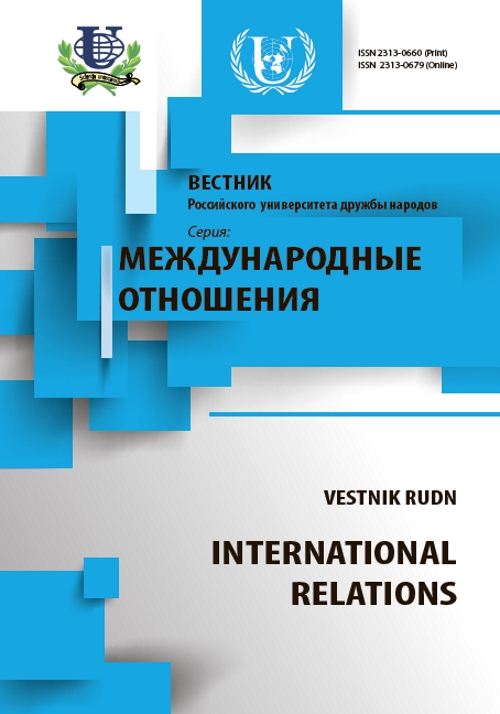No 1 (2008)
- Year: 2008
- Articles: 12
- URL: https://journals.rudn.ru/international-relations/issue/view/639
ARTICLES
Ideology of the Global hegemony of the USA
Abstract
The US policy is based on the realization of the country's national interests by the forces in power. American policy is based on various concepts of national interest, depending on the character of the relations between the United States, the European Union and Russia.
Vestnik RUDN. International Relations. 2008;(1):5-14
 5-14
5-14


Functional assessment of the transformation of the US armed forces
Abstract
The article deals with the functional assessment of the transformation of the US armed forces. The author analyses the American military-political concepts underlying this transformation and explaining the specific features of the use of force in the present conditions.
Vestnik RUDN. International Relations. 2008;(1):15-21
 15-21
15-21


Left extremism in Latin America: socio-political aspects
Abstract
The article investigates the contemporare state of left extremist ideology in Latin America and its political reprezentatives, their relations and corelations with the left centrists and their opposite attitudes to the ruling elite of USA, which leads to their regional integration.
Vestnik RUDN. International Relations. 2008;(1):22-33
 22-33
22-33


 34-45
34-45


Problems of adaptation of the standards of the European charter of local self-government to the Russian model of political-administrative relations
Abstract
The article is devoted to the examination of the contemporary model of political-administrative relations between the bodies of state power and the local authorities in the context of the requirements of the European Charter of Local Self-government.
Vestnik RUDN. International Relations. 2008;(1):46-54
 46-54
46-54


The soviet troops' invasion of Afganistan: causes and consequences
Abstract
The author analyses documents which make it possible to form an idea about how the crucial decision of bringing in Soviet troops to Afghanistan was adopted, what preceded it and how that decision influenced the international position of the Soviet Union.
Vestnik RUDN. International Relations. 2008;(1):55-67
 55-67
55-67


 68-84
68-84


American-Turkish relations in the post-Iraqi period
Abstract
The article dwells on the main directions of the strategic cooperation between the United States and Turkey during the post-Iraqi period and analyses the key problems which have a destructive influence on the development of the relations between the two countries.
Vestnik RUDN. International Relations. 2008;(1):85-95
 85-95
85-95


Main tendencies in drawing direct foreign investments to the republic of Kazakhstan
Abstract
The author analyses the drawing of foreign investments to the Republic of Kazakhstan, and characterizes the main stages of the formation of the investment process, and also the measures to ensure the qualitative development and competitiveness of the country.
Vestnik RUDN. International Relations. 2008;(1):96-109
 96-109
96-109


 110-117
110-117


Events of 2007: view from Russia
Vestnik RUDN. International Relations. 2008;(1):118-124
 118-124
118-124


The autors
Vestnik RUDN. International Relations. 2008;(1):125-125
 125-125
125-125











